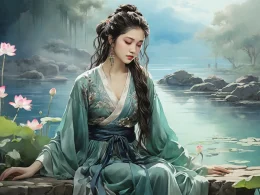The Fragrant Path and Longzhou are thorns and waste now seen,
Where luxury and revelry turned to winds mournful and lean.
The King of Wu sowed ruin in all he undertook—
Could Xi Shi outshine all his harem? Don't mistook!
Original Poem
「吴宫怀古」
陆龟蒙
香径长洲尽棘丛,奢云艳雨只悲风。
吴王事事须亡国,未必西施胜六宫。
Interpretation
This heptasyllabic quatrain was written by the late Tang poet Lu Guimeng. While residing in Songjiang, he often visited the relics of the Wu Kingdom, and this poem was composed during such an excursion, inspired by the scene. Living in the late Tang—a period marked by corrupt governance, separatist warlords, fierce factional strife, and the dominance of treacherous officials—Lu found that upright scholars were often marginalized. Using history to critique the present, he reflects on the fall of the Wu Kingdom to express his condemnation of rulers whose decadence led to national ruin.
The title "Wu Palace" refers to the palaces built by King Fuchai of Wu, such as the Guanwa Palace, symbolizing both past glory and present desolation. Through this historical mirror, Lu alludes to the late Tang political scene, exposing the perils of extravagance and corruption.
First Couplet: "香径长洲尽棘丛,奢云艳雨只悲风。"
Xiāng jìng Cháng zhōu jǐn jí cóng, shē yún yàn yǔ zhǐ bēi fēng.
Fragrant Path and Longzhou Park are now thickets of thorns;
Extravagant clouds and wanton rain—only a mournful wind remains.
The couplet opens with a "then-and-now contrast," starkly opposing past splendor and present ruin. "Fragrant Path" (香径 Xiāng jìng) and "Longzhou Park" (长洲 Cháng zhōu) were once beautiful sights of the Wu palaces; now "thickets of thorns" (尽棘丛 jǐn jí cóng) symbolize prosperity turned to decay. "Extravagant clouds and wanton rain" (奢云艳雨 shē yún yàn yǔ) allude to the palace’s revelries, now replaced by a "mournful wind" (悲风 bēi fēng), conveying the shift from opulence to desolation and hinting at the causes of the kingdom’s fall.
Second Couplet: "吴王事事须亡国,未必西施胜六宫。"
Wú wáng shì shì xū wáng guó, wèibì Xī Shī shèng liùgōng.
The King of Wu’s every act doomed his state to ruin—
It was not necessarily that Xishi outshone the palace maids.
Here, the root of the nation’s fall is directly stated, rejecting the traditional "beauty as calamity" narrative. The poet clearly argues that the responsibility lies with the king’s decadence and misrule, not with Xishi’s charm. This refutes the notion of "female-induced ruin" and criticizes the ruler’s folly.
Holistic Appreciation
Though brief, the poem is profound in meaning. Using a then-and-now contrast, it juxtaposes past glory and present desolation to underscore historical lessons. The first two lines express emotion through scenery, depicting the ruins of the Wu Palace and emphasizing the inevitability of decline after prosperity; the latter lines directly address the cause of the fall, blaming the emperor’s incompetence rather than attributing it to a woman, intellectually transcending the conventional "feminine祸" (female calamity) theory.
The language is refined yet emotionally intense, blending historical profundity with satirical relevance. Using history as a mirror, Lu Guimeng alludes to the corruption and crises of the late Tang, infusing the ancient tale of Wu with contemporary concern, revealing his patriotic care and lucid political insight.
Artistic Merits
- Then-and-now contrast, scene-emotion fusion: The past glory of "Fragrant Path" and "Longzhou Park" opposed to their present "thickets of thorns" creates a stark contrast, intensifying the weight of history.
- Profound allusions, distinct寓意 (yùyì, implied meaning): "Extravagant clouds and wanton rain" allude to palace decadence; "Xishi" represents the traditional "beauty as calamity" trope. The poet skillfully uses典故 (diǎngù, allusions) to sharpen critique, directly blaming the ruler.
- Direct expression, pointed discourse: The line "not necessarily that Xishi outshone" confronts historical truth, moving beyond vague historical scenery to address political roots with strong critical spirit.
- Conciseness and potency: In just 28 characters, the poem progresses from scenery to discourse and then to direct statement, meaningfully layered and highly condensed.
Insights
This work not only criticizes King Fuchai’s decadence but also negates the "beauty as calamity" theory. It teaches that the rise and fall of nations historically stems not from women but from rulers’ actions and political corruption. Through this poem, Lu Guimeng reminds later generations to learn from history, recognize the pattern of prosperity and decline, and rightly assign responsibility to rulers. Today, it remains deeply警示 (jǐngshì, warning): the fate of societies should not be blamed on external factors but addressed through institutional and human agency.
About the poet

Lu Guimeng (陆龟蒙 ?– c. 881 CE), a native of Suzhou, Jiangsu, was a Late Tang dynasty writer and agronomist. After failing the imperial examinations, he retreated to a reclusive life in Puli, Songjiang. He formed a famous literary partnership with the poet Pi Rixiu, and the pair are often referred to collectively as "Pi-Lu." His poetry is known for its social satire and a style that is incisive yet subtly restrained. His inclusion in the Biographies of Talents of the Tangunderscores his significance. The modern writer Lu Xun famously praised his essays, noting that they provided "a sharp radiance piercing through a world of muddle". Lu Guimeng is regarded as a uniquely distinctive voice in the literary scene of the late Tang.












